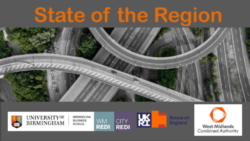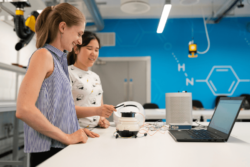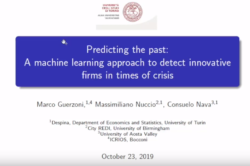Dr Abigail Taylor provides an economic snapshot of the Black Country LEP area following the five foundations of the Industrial Strategy: Ideas, People, Infrastructure, Business Environment and Place. As part of the Midlands Engine Economic Observatory work, WM REDI and the Black Country Consortium Economic Intelligence Unit developed Local Economic Partnership (LEP) level profiles. We … Continue reading “The Black Country LEP Area – A Profile”
Tag: Innovation
From Great R&D to Better Outcomes for the UK
This is part one of a two-part blog by Professor Simon Collinson on R&D, innovation and regional growth, following an academic forum hosted by WM-REDI and UKRI that discussed the evidence that should inform the government’s place R&D strategy. It was first published on the UKRI website. A successful national R&D system is, by definition … Continue reading “From Great R&D to Better Outcomes for the UK”
Policy Briefing – Economic Recovery Post COVID-19: The MIT Regional Entrepreneurship Acceleration Programme (REAP)
In this policy briefing, Dr Chloe Billing, on behalf of the West Midlands MIT REAP team, discusses the development and analysis of a set of indicators to assess the capability to support Innovation and Entrepreneurship in the West Midlands region. In March 2020, the Massachusetts Institute of Technology (MIT) launched a pilot in the UK … Continue reading “Policy Briefing – Economic Recovery Post COVID-19: The MIT Regional Entrepreneurship Acceleration Programme (REAP)”
Economic Recovery Post COVID-19: The MIT Regional Entrepreneurship Acceleration Programme (REAP)
Dr Chloe Billing discusses the goals and objectives of MIT’s Regional Entrepreneurship Acceleration Programme, the aims of its pilot programme in the UK and what the MIT REAP West Midlands is doing to help the region recover from COVID-19. In March 2020, the Massachusetts Institute of Technology (MIT) launched a pilot in the UK … Continue reading “Economic Recovery Post COVID-19: The MIT Regional Entrepreneurship Acceleration Programme (REAP)”
Why is the West Midlands Attractive to Private R&D Investments but Not Government Funding?
Last week, NESTA launched a report on government spending on R&D and regions. The report was written by Tom Forth (Open Data Institute Leeds) and Richard Jones (University of Manchester) and was commissioned to present analysis on where and how R&D (public and private sector) is distributed across the UK. This blog pulls out key … Continue reading “Why is the West Midlands Attractive to Private R&D Investments but Not Government Funding?”
Optimising Entrepreneurial Development Processes for Smart Specialisation in the European Union
Optimizing entrepreneurial development process for smart specialization in the European Union by Laszlo Szerb, Raquel Ortega-Argiles, Zoltan Acs and Eva Komlosi. This paper published in Regional Science demonstrates how the Regional Entrepreneurship and Development Index (REDI) can be used to optimize local entrepreneurial discovery processes, in a manner which can support the construction of regional … Continue reading “Optimising Entrepreneurial Development Processes for Smart Specialisation in the European Union”
The Impact of COVID-19 on Firm Innovation: The Case of the West Midlands
In this blog, Dr Chloe Billing explores the impact of COVID-19 on innovation activities in the West Midlands. A full range of business support measures has been made available to UK businesses to help with the current COVID-19 crisis. These were discussed in a recent blog by Professor Raquel Ortega Argiles and include the Coronavirus … Continue reading “The Impact of COVID-19 on Firm Innovation: The Case of the West Midlands”
REDI to Debate – The Effect of COVID-19 on Levelling-Up and the Government’s Green Book
Welcome to REDI to Debate in the first edition of REDI-Updates. REDI-Updates is a bi-annual publication which will get behind the data and translate it into understandable terms. WM REDI staff and guest contributors will discuss various topics, with this first publication focusing on how inclusive growth can be a tool to tackle regional imbalances … Continue reading “REDI to Debate – The Effect of COVID-19 on Levelling-Up and the Government’s Green Book”
How Iceland Is Using Digital to Increase Public Participation in Politics
There are a few countries that immediately spring to mind when thinking about e-government, or the digital transformation of public services and using the internet to alter the relationship between the citizen and the state. Estonia is the poster child for this movement, with its digital voting platforms, e-residency for businesses and innovative information-sharing systems … Continue reading “How Iceland Is Using Digital to Increase Public Participation in Politics”
City-REDI Seminar Series: Predicting the Past: A Machine Learning Approach to Detect Innovative Firms in Time of Crisis
Presenter: Marco Guerzoni, Associate Professor of Applied Economics, Department of Economics and Statistics “Cognetti de Martiis”, University of Turin On the 23rd of October 2019, Marco Guerzoni presented the first City-REDI seminar of 2019. You can watch a video of the presentation below (Apologies but there is a slight buzz on the recording). Abstract: This … Continue reading “City-REDI Seminar Series: Predicting the Past: A Machine Learning Approach to Detect Innovative Firms in Time of Crisis”










